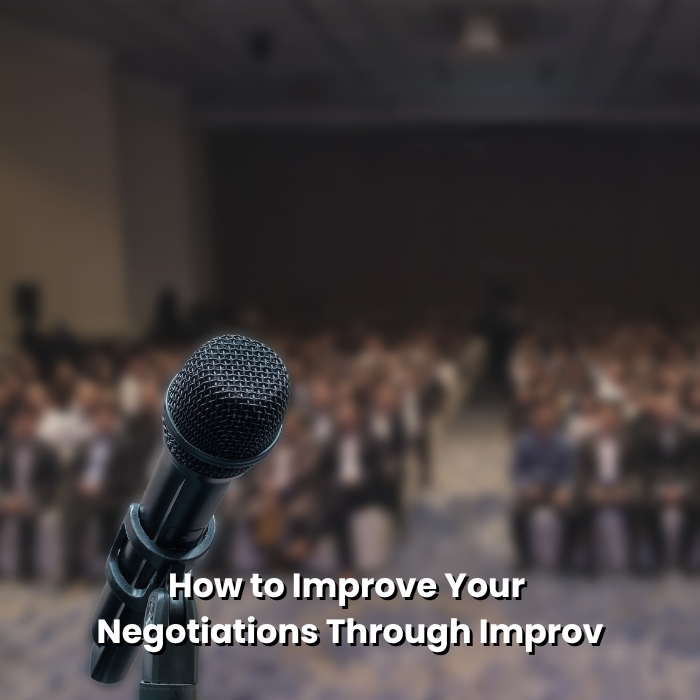
Recognize How Bias Can Sabotage Your Negotiations Part I
Do you consider yourself to be a biased person?
If you answered ‘no’, you’d be mistaken. We all carry biases – some conscious, many not. You bring these biases to everything you do in life. And so, they affect most human interactions. As all of life is a negotiation, it’s important to be aware of them. Otherwise, you’ll drag your biases into every negotiation, sabotaging your chances of best outcomes.
Before you enter any negotiation, it’s prudent to consider both your biases and the likely biases of the other party. To help you in that process, let’s explore the types of bias, how they show up and how you can overcome them.
At the outset I’d note that there are countless academic articles written on bias and various methods of categorizing types of bias. The reality, however, is that many of the categories and types overlap and can’t always be neatly compartmentalized. No worries though. It’s not the labelling that’s important. It’s simply raising your awareness so you can recognize when bias is showing up and affecting how you process information.
Whether you call a bias cognitive, motivational, informational, selection, heuristic, linguistic, or any of the other many categories assigned to the various biases is less important than recognizing that bias is at play and getting intentional about diffusing the bias.
In this two-part series, I hope to provide a handy checklist of the most common biases. In this part (Part I) we explore various ‘personal’ biases and how they show up.
I invite you to identify your go-to bias ‘poisons’. Explore this list with an open mind and heart with a view to recognizing your guilty bias traps.
Self-serving bias
Self-serving bias shows up in a number of ways. It skews perception when we seek to perceive ourselves in an overly favourable light to maintain or enhance our self-esteem. It rears its head when we attribute our successes and positive outcomes to our skill yet blame our negative outcomes on bad luck. i.e. when we see our successful projects as the result of our brilliance and hard work but see our failures as the result of the team (or someone else) dropping the ball or not properly supporting the initiative.
It also influences our perceptions of fairness. We see our positions as imminently fair and reasonable while projecting our negative attributes onto the other party.
Egocentrism
Some see egocentrism as a subset of self-serving bias, while others see it as a stand-alone category. At its core, egocentrism shows up as tunnel vision or self-focus. This bias prevents us from truly appreciating the position of the other party as our focus is too narrowly on our own goals, outcomes, positions, etc.
Inattentional blindness
Again, some consider inattentional blindness to be the same as (or at least a subset of egocentrism and/or self-serving bias, whereas others believe the distinction warrants its own category. Inattentional bias is when we see, hear and experience only what we’re focused on. When we only focus on our own needs we inevitably miss out on valuable information and insights; important cues, signals or signs; and also on opportunities.
There are variations of a powerful study that exemplifies this bias and its impact. A video is shown of a group passing a basketball, half wearing white shirts and half black. Participants are asked to count how many times the white ‘team’ passes the ball to each other. Incredibly the majority of participants fail to notice a large gorilla jumping into the fray midway through the play. When the focus in on counting the number of passes, other glaring and obvious sensory input is missed altogether.
Overconfidence bias
A sister to self-serving bias is overconfidence bias. This comes from a false sense of your own skill or talent. It can manifest as having an unjustified illusion of control in your negotiations. It can also show up as what’s sometimes called the ‘desirability effect’ i.e. what I want to happen will happen because I want it to.
Endowment bias
Endowment bias is arguably a sister to overconfidence bias but applies to how we value what we own or what we bring to the table. i.e. when we over-value something we own or contribute.
We see examples of this in real estate deals where vendors over-value their properties (based on sweat equity or emotional attachment, etc) and find it hard to accept market valuations. We also often see this in bartering situations where one party believes their end of the barter is considerably more valuable than what the other party brings to the table. For the same reason, many partnerships flounder as one party over-values their contribution to the relationship vis-à-vis the other party’s.
Confirmation bias
Confirmation bias is the tendency to search for and interpret information in way that confirms our preconceptions. Henry Thoreau is credited with observing that “We only see the world we look for.”
The world is rife with this problem today. Social media exacerbates this bias as ‘news feeds’ we receive give us more of what we already believe. Everyone becomes even more entrenched in their belief about the rightness of their position. You are better served when you’re able to show up with an open mind to truly listen to perspectives and positions of the other party and to seek out information contrary to your already held beliefs (i.e. be willing to challenge your preconceptions).
Expectation bias
Tied to confirmation bias (but arguably a separate category) is what I call expectation bias. We tend to attract what we expect. If we expect the other party to show up as unreasonable and overly aggressive, our perception of the encounter will meet and reinforce our expectation. If we expect the worst, we’re likely to get (or at least see) the worst, and by contrast, if we expect the best we’re more likely to get (or see) the best.
Affinity Bias
Affinity bias relates to the predisposition we all have to favour people who remind us of ourselves. We see this as early as elementary school yards where kids gravitate and judge more favourably those like them and tend to shun those who are different. This bias causes us to discount potential valuable input, perspectives and input from those unlike us. While this is problematic in any negotiation, it is particularly problematic in cross-cultural negotiations.
Did any of these bias types resonate with you? Raising your awareness about your personal biases is a great starting point to overcoming the adverse impact of bias in your negotiations. Stay tuned next week for Part II where we’ll dig deeper, exploring biases beyond the personal.
- Negotiate a Boost to Your Immune System - January 20, 2025
- Negotiating Tips from a Former Hostage Negotiator Isaac Betancourt - January 16, 2025
- How to Improve Your Negotiations Through Improv - January 15, 2025






